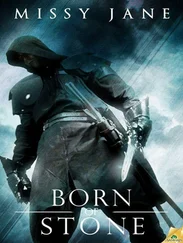Her mother and Grace taught her simple sewing, her mother offering single-word corrections now and then, while Grace did the hands-on teaching. Jane’s hands were small and clumsy and she pricked herself, her bottom lip trembling when she tried not to cry. Be patient , her mother said, and she tried, and got better. The idea was it might be something useful in life when there was no more mother, no more father, nothing but the farm, which would probably be sold by her older siblings. It was understood that Grace would have to make do on her own soon enough, as well. Either get married or go to find work in town.
She got better at sewing and soon even enjoyed it, applying a child’s blind concentration to the task, from mending seams and sewing patches into quilts, up to eventually using the machine to make simple smocks and skirts and then dresses. She liked the rhythm of pumping the machine’s treadle to keep the stylus going and guiding the material through. She had to stand to reach it with her foot. Everything else disappeared from her mind. She was more like her father than her mother. He did not mind work, easily focused on a task.
Perhaps as a consolation for not having school to look forward to, she was given freedom to wander about the whole place as she wanted. She walked the path through the woods that were charmed with their strange stillness and the scents of various plants and rich earth beneath moldering leaves. She walked the path down to the beaver pond, which was so much prettier in its wooded canyon than the cow pond sitting in the open and surrounded by hoof-cleaved muddy banks at the edge of their south pasture. She came out and sat on the hill above those woods and watched, at the juncture of field and woods down below, a pack of scruffy stray dogs that she imagined were the wild dogs she’d been cautioned about. They skirted the field in a silent little troop, tongues lolling, then disappeared into the undergrowth again, as if they’d been a ghost pack not really having been there except in her own mind.
HER FATHER TOOK her fishing one Saturday afternoon when the bream were on their beds, down at the beaver pond. They walked the trail slowly, her father guiding the tips of their two cane poles through the tree limbs and saplings and shrubbery along the trail, and sat in the shade over a bed and pulled out more than a dozen of the broad, snub-nosed sunfish, wriggling. They were bluegills and bigger ones her father called shell crackers. The tug on her line ran a current from the line and pole straight through her body, a long-lined static shock, and she soiled herself in excitement. Her father only laughed a little and told her to toss her undergarment aside and lift her skirt and go for a little cool wade down the bank at a clear and shallow spot. When she hesitated, he said, “It’s safe there, go on.” Her mother had forbidden her to go down to the pond by herself and said the water was dangerous, as if she had a morbid fear of it herself. Her father came over, found a stick, and told her to beat the grass near the edge before stepping through it, to scare off any snake that might be resting there. She whacked at the grass, waited a moment, hesitating again, looking at the smooth brown surface of the water. “Go on, now,” her father said again. She carefully took a step in, ankle-deep. The cool water on her skin, the cool mud of the bottom squishing up between her toes, was delicious to her senses.
“Now, how’s that?” he said.
“It’s grand, Papa,” she called back, and when she came out again he gave her a little one-armed hug, an expression of sentiment so rare in their household that it sent her senses singing all over again, and brought the beginning of tears to her eyes, which she hid by walking away and picking wildflowers on the little hill above the pond and bringing them back to him.
“That’s good,” he said. “Your mama can set them on the table for our supper.”
That evening they had a big mess of crisply fried bream and her father showed her how to nibble on the crisp, salty tails, which Grace said was disgusting but they ignored her. The delicate white meat peeled easily off the fishes’ thin bones and you could pull the whole skeleton and head away, which seemed in its simplicity almost a miracle.
“Why haven’t we done this before?” she said, and her father said he guessed he’d just got out of the habit, and they would have to do it again soon.
“I think your mama got tired of them,” he said.
“Well, tired of cleaning them, maybe,” their mother said, frowning at being called out.
As her father rose to go be by himself, and Grace and her mother began to clean the table and wash dishes, she sat looking at her own, with its two beautifully symmetrical, cleaned fish skeletons lying there in a thin film of congealed grease. It occurred to her what a very strange creature a fish was, a thing that lived in the water, underwater. And somehow breathed water, which would kill a body fool enough to try it, though she’d once wondered if she could sift it carefully through her lips and make that work, and when she’d mentioned it to her father, he’d blanched and said, “Don’t ever try that.”
Now in this moment she wished she had paid more attention when her mother was cleaning the fish, scraping out their insides, their small and delicate organs, had gazed on the mystery of them. And she wished she had asked her mother for one of the heads, so that she could peer closely at those gills, what they had instead of lungs, her father said, with their strange, blood-filled filaments that were apparently the secret to their magical abilities to live as they did.
She wondered what happened to a fish that was born without them. If it just floated to the surface of the water and died.
HER FATHER WOULD point things out to her. He knew the names of most trees, the oaks, elms, sycamore and sweetgum, the beech, pines, hickory, the maples, redbud, dogwood, the hollies, magnolia, swamp bay, cherry, cypress, pecan. Some shrubs, the buckeye, sweetshrub, huckleberry, sumac, snowbell. Flowers, lily of the valley, wisteria, joe-pye weed, jack-in-the-pulpit.
Of the mushrooms roosting in the loam and on the bark of trees live and rotten, he would only say some knew which ones you could eat but that he’d had an uncle who thought he knew them and died after making a mistake one day. “Stay away from them,” her father said.
When she would go into the woods with her mother it was for the express purpose of gathering edible plants and herbs for use in food dishes and medicinal potions. Chicory, dandelion greens, primrose root, wild strawberries, garlic, and wild onion. Teaberry, beechnuts, sassafras, blackberries, blueberries, rose hips for tea and jelly. She showed Jane how to prepare them, and when they were in the kitchen preparing for a regular meal she would call out the names of this one or that, and if Jane was unable to recall their uses and method of preparation, she would sometimes come over and pluck a single dark brown hair from Jane’s head and say, “You don’t want to be going around bald-headed for not knowing your lessons, do you?”
When she walked alone in the woods barefoot at midday after the noon meal she tried remembering the names of the trees and shrubs and flowers. She was fascinated by the mushrooms and their dry or slimy tops and delicate stems and gills beneath their caps. She liked to pop her toes against the ones that burst into orange dust that bloomed in the breezeless air. But it was the quiet, modest ones that were most interesting. If they didn’t want you to see them, you would not. They lived out their lives in shade and dampness, quivering when you passed and going so still if you happened to notice and squat down to take a closer look, to touch. One day she came upon a strange one that was not at all modest, growing straight up and tall with a small cap on its top. She broke it off at the base and took it home to show her father, but her mother saw it first and snatched it from her hand and threw it into the hog slop bucket.
Читать дальше












